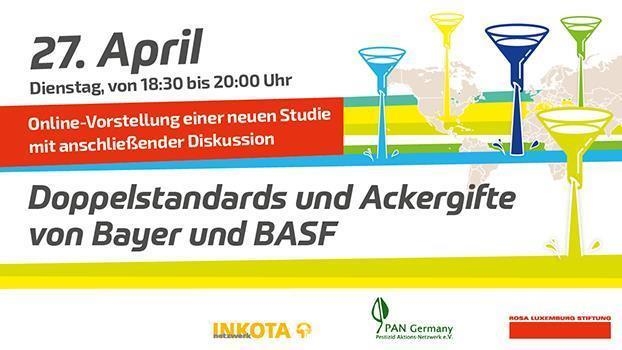
Wo und wie: Die Veranstaltung findet als Online-Event statt, Registrierung über: https://inkota-de.zoom.us/webinar/register/WN_BSHBOtBIS0Gw-clRP2fh7w
Die Agrarchemiekonzerne Bayer und BASF vermarkten Pestizidprodukte und Wirkstoffe im globalen Süden, die in der EU auf Grund ihrer Gefahren für die Umwelt oder menschliche Gesundheit nicht genehmigt oder verboten sind. Derartige Geschäftspraktiken sind zwar legal, stehen jedoch als Doppelstandards zunehmend in der Kritik.
Die Rosa-Luxemburg-Stiftung, das INKOTA-netzwerk und PAN Germany haben einen Blick hinter die Kulissen des internationalen Handels mit Pestizidwirkstoffen geworfen. Im Fokus stehen die beiden deutschen Agrarchemiegiganten Bayer und BASF. Die vorliegende Studie beleuchtet die Giftigkeit und Verwendung von Bayer- und BASF-Wirkstoffen in Brasilien, Mexiko und Südafrika.
Die Liste der Wirkstoffe, die durch Bayer und BASF ihre Verbreitung in der Welt gefunden haben und hochgefährlich für die menschliche Gesundheit sind, ist lang. Hinter abstrakten Bezeichnungen wie Glufosinat, Spirodiclofen und (Beta-)Cyfluthrin verbergen sich konkrete Gefahren: sie sind hochgiftig, wahrscheinlich krebserregend oder erbgutschädigend.
Die Studie deckt auf, welche hochgefährlichen Wirkstoffe die Agrarchemiekonzerne Bayer und BASF entwickelt und/oder vermarktet haben – und dies zum Teil heute noch (über Umwege) tun. Durch die eingehende Analyse des Pestizid- und Wirkstoffmarktes in Südafrika, Brasilien und Mexiko werden das Ausmaß und die Intransparenz des lukrativen Geschäfts mit den Ackergiften deutlich. Im Gegensatz dazu stehen die verheerenden Auswirkungen des Pestizideinsatzes auf die Gesundheit von Indigenen und Landarbeiter*innen in den drei Ländern.
Die Autor*innen und Aktivist*innen stellen die Ergebnisse der Studie vor und diskutieren in einem offenen Format über weitere Fragen.
Vorstellung der Studie Doppelstandards und Ackergifte von Bayer und BASF: Ein Blick hinter die Kulissen des internationalen Handels mit Pestizidwirkstoffen und Diskussion mit Peter Clausing (PAN Germany), Wiebke Beushausen (INKOTA-netzwerk), Colette Solomon (Women on Farms, Südafrika) und Irma Gómez (Alianza Maya por las Abejas, Mexiko)
Moderation: Jan Urhahn (Rosa-Luxemburg-Stiftung)
Das Online-Event findet auf Deutsch und Englisch mit Simultanübersetzung statt. Eine gemeinsame Veranstaltung der Rosa-Luxemburg-Stiftung, INKOTA-netzwerk und PAN Germany.
Double Standards and Hazardous Pesticides from Bayer and BASF
A glimpse behind the scenes of the international trade in pesticide active ingredients
Presentation of the study and discussion with
Peter Clausing (PAN Germany), Wiebke Beushausen (INKOTA-netzwerk, Germany), Colette Solomon (Women on Farms, South Africa), and Irma Gómez (Alianza Maya por las Abejas, Mexico)
Moderation: Jan Urhahn (Rosa-Luxemburg-Stiftung, Southern Africa)
When: Tuesday, 27 April 2021, 18:30 to 20:00 (CEST)
Where and how: The event will take place as an online discussion, registration required: https://inkota-de.zoom.us/webinar/register/WN_BSHBOtBIS0Gw-clRP2fh7w
The agrochemical companies Bayer and BASF continue to market pesticides and active ingredients in the Global South that are not approved or even banned in the EU due to the risks they pose to the environment or human health. Such business practices are legal, but increasingly criticized as double standards.
The Rosa-Luxemburg-Stiftung, the INKOTA-netzwerk, and PAN Germany have taken a glimpse behind the scenes of the international trade in pesticide active ingredients, focusing on the two German agrochemical giants, Bayer and BASF. The new study sheds light on the use of Bayer and BASF active ingredients in Brazil, Mexico, and South Africa, and the harm these chemicals bring with them.
The list of active ingredients highly hazardous to human health that have found their way around the world through Bayer and BASF is long. Terms like glufosinate, spirodiclofen, and (beta-)cyfluthrin conceal concrete hazards: they are highly toxic, probably carcinogenic or mutagenic.
The study reveals which highly hazardous active ingredients were developed and/or marketed by these two German agrochemical corporations. They are still marketed by them in some cases even today, albeit sometimes in a hidden manner. This in-depth analysis of the pesticides and active ingredients markets in South Africa, Brazil and Mexico reveals the extent and non-transparency of the lucrative business with hazardous pesticides. This contrasts with the devastating effects of pesticide use on the health of indigenous people and farmworkers in the three countries.
The authors and activists will present the results of the study and discuss further questions in an open format.
This online event will be held in English and German with simultaneous interpretation.
A joint event by the Rosa-Luxemburg-Stiftung, the INKOTA-netzwerk, and PAN Germany.
Contact
Jan Urhahn
Food Sovereignty Programme Director, Rosa-Luxemburg-Stiftung
Email: jan.urhahn@rosalux.org
Phone: +27 10 4460538